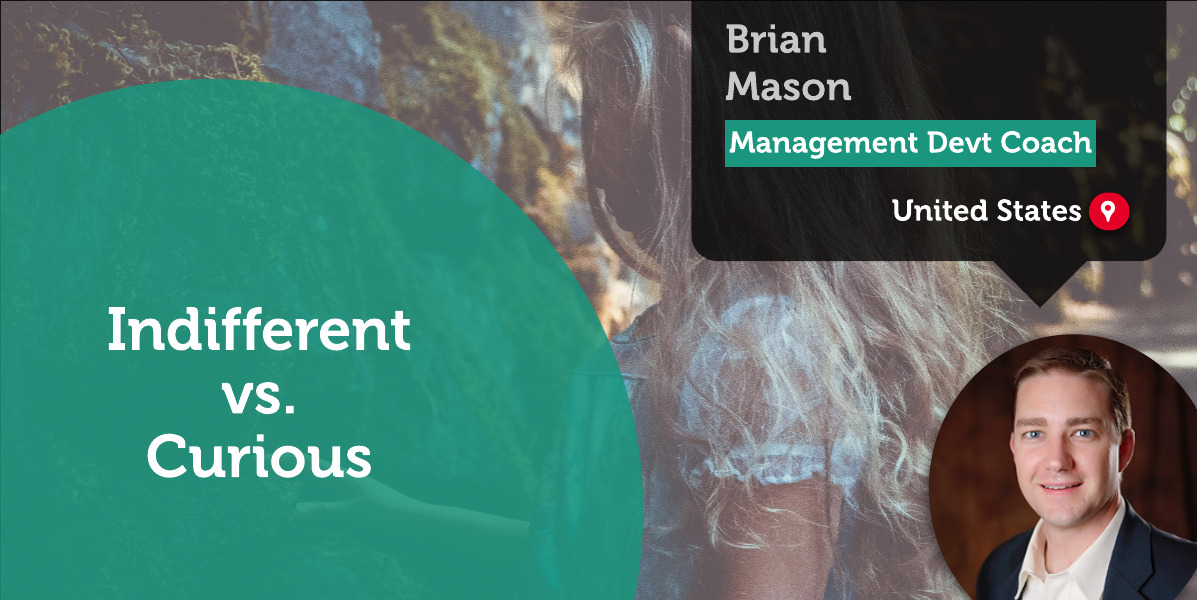A Coaching Power Tool By Brian Mason, Management Development Coach, UNITED STATES

Managers and Coaches’ Indifferent vs. Curious Approach
 By 2030, Deloitte experts predict a highly cooperative, engaging, and socially inclusive atmosphere will dominate our future workplace and communities. Managers and coaches will be crucial to creating and sustaining this atmosphere.
By 2030, Deloitte experts predict a highly cooperative, engaging, and socially inclusive atmosphere will dominate our future workplace and communities. Managers and coaches will be crucial to creating and sustaining this atmosphere.
Gallup estimates that actively disengaged employees cost the United States $483 billion to $605 billion each year in lost productivity. Increasingly, employees feel rather indifferent about their job and the work they are being asked to do across the United States. Much of the U.S. workforce (51%) is not engaged. While these employees are indifferent and indicate neither liking nor disliking their job, many employees want a reason to be inspired, to be engaged.
Approaching engagement as a business strategy yields clear and better results. And managers are at the front line of this effort. According to Gallup’s State of the American Workplace report, only 21% of employees strongly agree their performance is managed in a way that motivates them to do outstanding work.
It is crucial for the success of businesses everywhere to equip supervising managers fully and adequately with curiosity-based coaching philosophy, and the leadership skills and tools needed to lead people through the next decade. By 2030, Deloitte experts predict a highly cooperative, engaging, and socially inclusive atmosphere will dominate our future workplace and communities. Managers and coaches will be crucial to creating and sustaining this atmosphere.
Indifferent vs. Curious Explanation
Employees who are indifferent about what they do and why they do it create an all-but-impossible environment for companies to achieve organic growth. It not only drags down the business results but also takes an emotional toll on the managers attempting to enhance employee performance. One who is indifferent demonstrates a lack of interest or concern, a general sense of disinterest. While this sense of discontentment can be detrimental in the workplace, it can be ruinous if allowed to permeate one’s life.
On the other hand, accountable, responsible employees approach their jobs and life with curiosity. One who is curious is eager to know or learn something. Curiosity is a quality related to inquisitive thinking such as exploration, investigation, and learning. Curiosity turns the concepts of setbacks, mistakes, and failure into feedback, progress, and learning opportunities.
To illustrate the difference, consider the tale of two employees, one who shows up for work but is not really committed. They have become satisfied with mediocrity, exhibiting no interest in going above, let alone beyond, in their current workplace. The other is an accountable, responsible employee seeking ways to help their team grow the business and enhance their career prospects. Each has been assigned a process improvement project.
The accountable employee immediately asks, “What’s happening here?” She investigates by focusing on one-on-ones (1x1s) and asking questions. The other employee refuses to acknowledge what is happening, sizing up the issues as a blip or anomaly. He shrugs it off justifying the actions of others as ‘just having a bad week’. Meanwhile, the accountable employee learns that members of her team have felt their ideas and suggestions have been ignored in the past and are not sure what to do about it. By acknowledging this reality, the accountable employee owns her role by partnering with her manager to help find solutions.
The other employee keeps fighting reality. He comes up with an alternative view, placing responsibility elsewhere. “That’s not how I see it”, he counters.“If people in the company would just do their jobs, we wouldn’t have problems like this!”
The accountable employee looks for solutions. More important, she assumes she is part of the solution, asking, “What can I do?” The moment she finds the right tactic, she acts. “Circumstances won’t change by themselves”, she thinks, “so let’s test this out!” The other manager, having blamed everyone else, now excuses himself altogether. “This isn’t my job, why isn’t management doing their job!”, he declares, and settles into hoping things change for the better.
Told this way, the difference is pretty stark. One is actively trying to author her destiny. The other is simply along for the ride. One is acting accountable; the other is being indifferent, almost toxic. One will change the outcome. One won’t. No one is born indifferent; it is simply an attitude or an approach. But if allowed to persist, the cycle becomes a habit. The opposite is also true. Anyone can be accountable at any time, and the more one chooses an approach of curiosity, the more likely it is to become one’s automatic answer to any adversity.
Effective coaches and managers know this is the only way to uncover new solutions, apply them, and experience a different reality, so they take responsibility and run with it. They see outcomes as the information they can use to frame better actions to get better outcomes. It begins a cycle they understand and use to achieve extraordinary results.
Indifferent vs. Curious: Skills & Tools
More and more frequently, managers are being expected to demonstrate the ability to coach. Yet, these same managers receive little to no training or skill development. Raquel Baldelomar highlights the typical approach organizations take when promoting top performers to management positions; “The idea is that they know the business inside out and are highly successful in their position, so they would be the perfect candidates to manage others. And that may be true, but often the promotion comes with little or no management training, which leaves the star performer floundering while they try to figure out their new position.”Managers who employ a curiosity-based coaching philosophy and apply the following skills and tools toward leading their employees can see significant improvement.
Skills
Powerful Questions
The power of any question comes from its ability to create an awareness or eye-opening moment for clients, enabling them to re-frame the challenge, issue, or problem, and see it in a new way.
Active Listening
Active listening is truly attending to and “tuning in” to the person talking. It is not hearing until the other person has stopped talking so we can share our thoughts with them.
Awareness | Choice
These skills, accompanied by a heart toward self-awareness, can help others recognize their own perceptions, beliefs, and self-awareness. Creating awareness supports individuals in identifying the areas of their life that work for them and the ones that do not. Awareness becomes the first step toward resourcefulness.
Tools
Regular, Consistent 1x1s
Every employee deserves a great manager, and a great manager holds regular one-on-one time with each employee. It is during these conversations a manager will learn which employees are ready to quit, are indifferent, or excited. This is accomplished through employing the skills of active listening and powerful questions.
Assessments
Building relationships and creating effective workplaces takes time. One method to reduce this time and create greater awareness is using assessment programs. Two common assessment tools that benefit individuals and teams are Kolbe Corp’s Kolbe ATMIndex and CliftonStrengths by Gallup. Kolbe assesses the conative mind by identifying one’s innate approach to taking action. CliftonStrengths explain the ways one most naturally thinks, feels, and behaves.
It takes time and curiosity to practice and implements these skills and tools. The efforts to create an engaging and inclusive organization are worth it. According to Gallup’s report, organizations in the top quartile of engagement realize a 21% improvement in profitability.
It’s Important to Spot Indifferent vs. Curious Act
When you, as a coach or manager, spot indifference, it’s important to act—investigate by asking questions—rather than wait for the downward trend to gain momentum until the employee’s performance bottoms out or he or she quits.
- How might you use Powerful Questions to uncover someone’s interests?
- What would you require to improve your Active Listening Skills?
- What’s important about hearing the other person rather than thinking about how you might respond?
- How might your employees benefit from regular, consistent 1x1s with you?
- How might understanding someone’s tendency lead to greater awareness?
References
Baldelomar, R. (2017, August 01). Three Tips to Turn Indifferent Employees Into Top Producers.
Gallup, I. (2020, October 14). CliftonStrengths. Retrieved October 25, 2020
Kolbe Wisdom: The Three Parts of the Mind: Conative, Cognitive, Affective. (n.d.). Retrieved
October 25, 2020
It's (almost) all about me Workplace 2030: Built for us (pp. 1-24, Rep.). (2013). Sydney,
Australia: Deloitte.
Smyth, B. (2019, May 21). Get Employees to Care ... and End the Spread of Indifference.
Retrieved October 21, 2020
State of the American Workplace (pp. 1-214, Rep.). (2017). Washington, DC: Gallup.